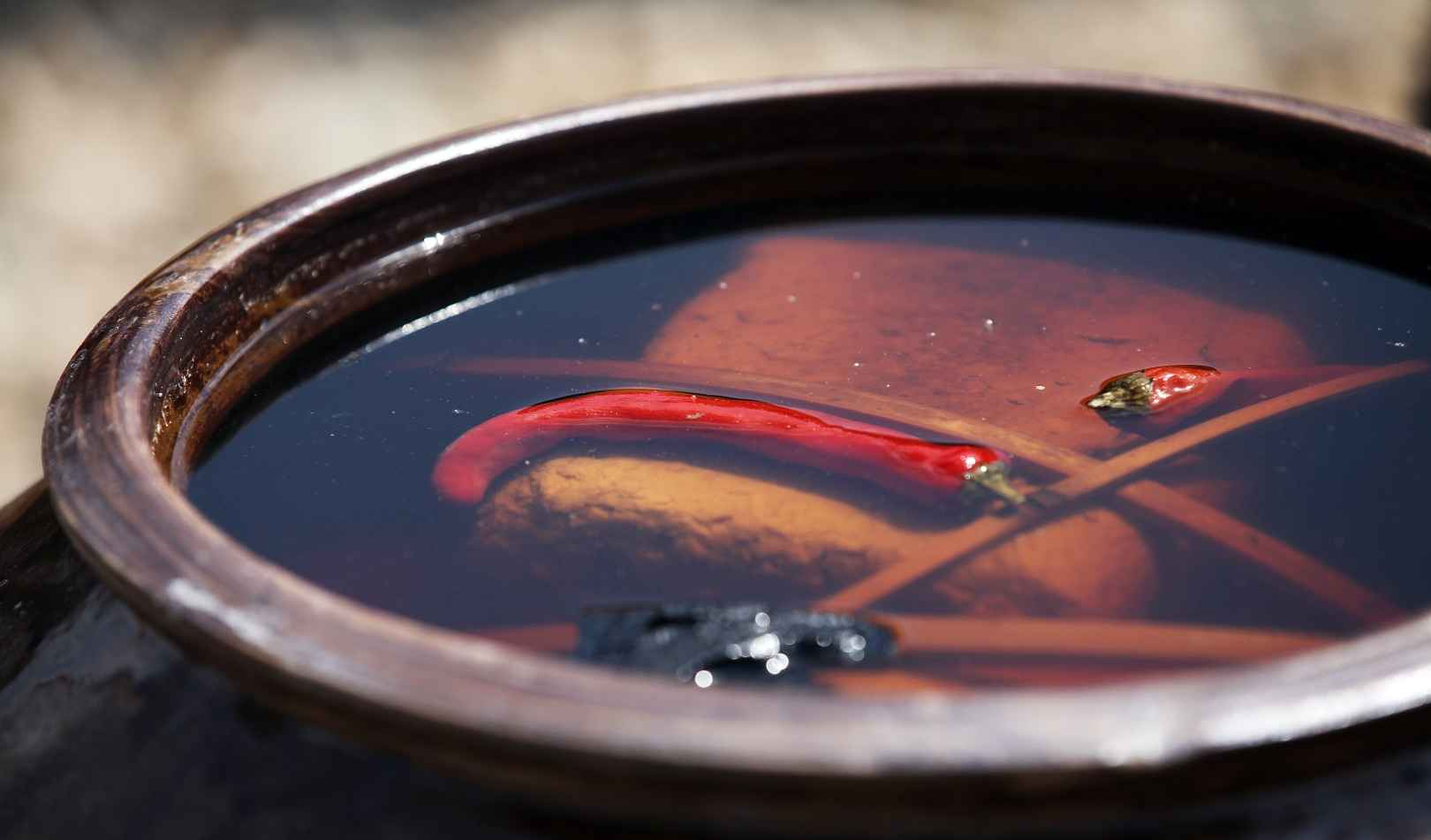Doenjang (된장) is a cornerstone of Korean cuisine, known for its deep umami and health benefits. While most people buy it pre-made, making your own fermented soybean paste at home offers a taste of tradition and a rewarding kitchen project. There are two main methods: using traditional meju blocks or using meju powder (메주가루).
Looking for an introduction? Check out our guide: What is Doenjang?
Method 1: Traditional Doenjang with Meju Blocks

- 1. Prepare the Meju: Rinse meju blocks with clean water. Let them air-dry for a day in the sun. Make sure there's no visible mold before placing in the jar.
- 2. Make the Brine: Mix sea salt with water in a ratio of 15-18% salt. For example, 1.5kg of salt to 10L of water. Stir until fully dissolved. Most traditional recipes recommend 17–18% salinity to ensure safe fermentation and prevent spoilage, especially in warmer climates.
- 3. Prepare the Onggi: Sterilize a large earthenware jar (onggi). Layer the meju blocks inside, then pour in the brine until they are fully submerged.
- 4. Add Natural Preservatives: Float a few dried red chilies and clean charcoal pieces on top to reduce odor and contamination.
- 5. First Fermentation: Cover with breathable cotton cloth and lid. Leave it in a sunny, ventilated spot for 50 to 60 days. Open the lid occasionally to let it breathe and remove mold if it appears.
- 6. Separate & Mash: After fermentation, remove the now-brewed soy sauce (ganjang, 간장). Then, mash the remaining blocks into a paste.
- 7. Second Fermentation: Transfer the mashed paste into another onggi jar. Age it for at least 3–6 months. The longer it ages, the deeper the flavor.

Simple Korean Doenjang with Meju Powder
Looking for a quick and easy way to make traditional Korean doenjang at home? This method uses meju powder instead of meju blocks, making it accessible and beginner-friendly.
- Meju powder: 1 kg
- Water: 2 liters
- Sea salt: About 350g (use coarse Korean sea salt if possible)
How to Make It
- Dissolve the salt in water completely to make a brine.
- Add meju powder to the brine and mix thoroughly. The texture should be moist and thick like a paste - not runny or watery.
- Transfer the mixture into a clean earthenware jar (onggi) or airtight container.
- Cover with breathable fabric or paper, and let it ferment at room temperature.
- Let it age for 1–3 months depending on the season. The flavor deepens over time.
This recipe yields approximately 3 kg of doenjang. It's an easy way to enjoy homemade fermented soybean paste regardless of the season.
Traditional Market-Style Doenjang
In most traditional Korean markets, homemade doenjang is displayed in large earthenware jars or plastic tubs. Vendors use a ladle to scoop out the desired amount and pack it into plastic bags on the spot. This rustic and practical approach keeps the paste fresh while preserving its rich, fermented aroma.
Fermentation Tips & Warnings
- Adjust Salt by Season: Use slightly more salt in warmer seasons, and slightly less in winter to avoid over-fermentation or spoilage.
- Control Mold: Remove any white mold gently. Avoid green or black mold—if present, discard the affected parts.
How to Store and Use Homemade Doenjang
Once fully fermented, store your Doenjang in airtight containers in a cool place or fridge. Use it for Doenjang jjigae (된장찌개), stir-fried dishes, or as a seasoning base. Homemade paste offers a deeper, rounder flavor that store-bought can’t beat.

Can I Make Doenjang Abroad?
Yes! Many Korean grocery stores and online shops offer meju powder and onggi jars. Look for “meju powder for doenjang,” “fermented soybean powder,” or “doenjang starter kit.” You can even substitute the fermentation jar with a ceramic crock or food-grade plastic container if needed.
Conclusion
Whether using traditional meju blocks or convenient meju powder, making doenjang at home reconnects you with centuries of Korean culinary wisdom. Start small, and enjoy the transformation of simple soybeans into a powerful probiotic condiment.
'Korean Recipes' 카테고리의 다른 글
| Gochujang Chicken Sauce Recipe – Korean Sweet & Spicy Flavor (0) | 2025.07.11 |
|---|---|
| Gochujang Recipes You’ll Love: From Bibimbap to Korean BBQ (0) | 2025.07.10 |
| Sulppang (Makgeolli Steamed Bread): Korean Rice Wine Bread Recipe (0) | 2025.07.04 |
| Makgeolli Bingsu: Korea’s Coolest Fermented Dessert (0) | 2025.07.03 |
| Creative Recipes Using Makgeolli: From Ice Desserts to Steamed Buns (0) | 2025.07.03 |



